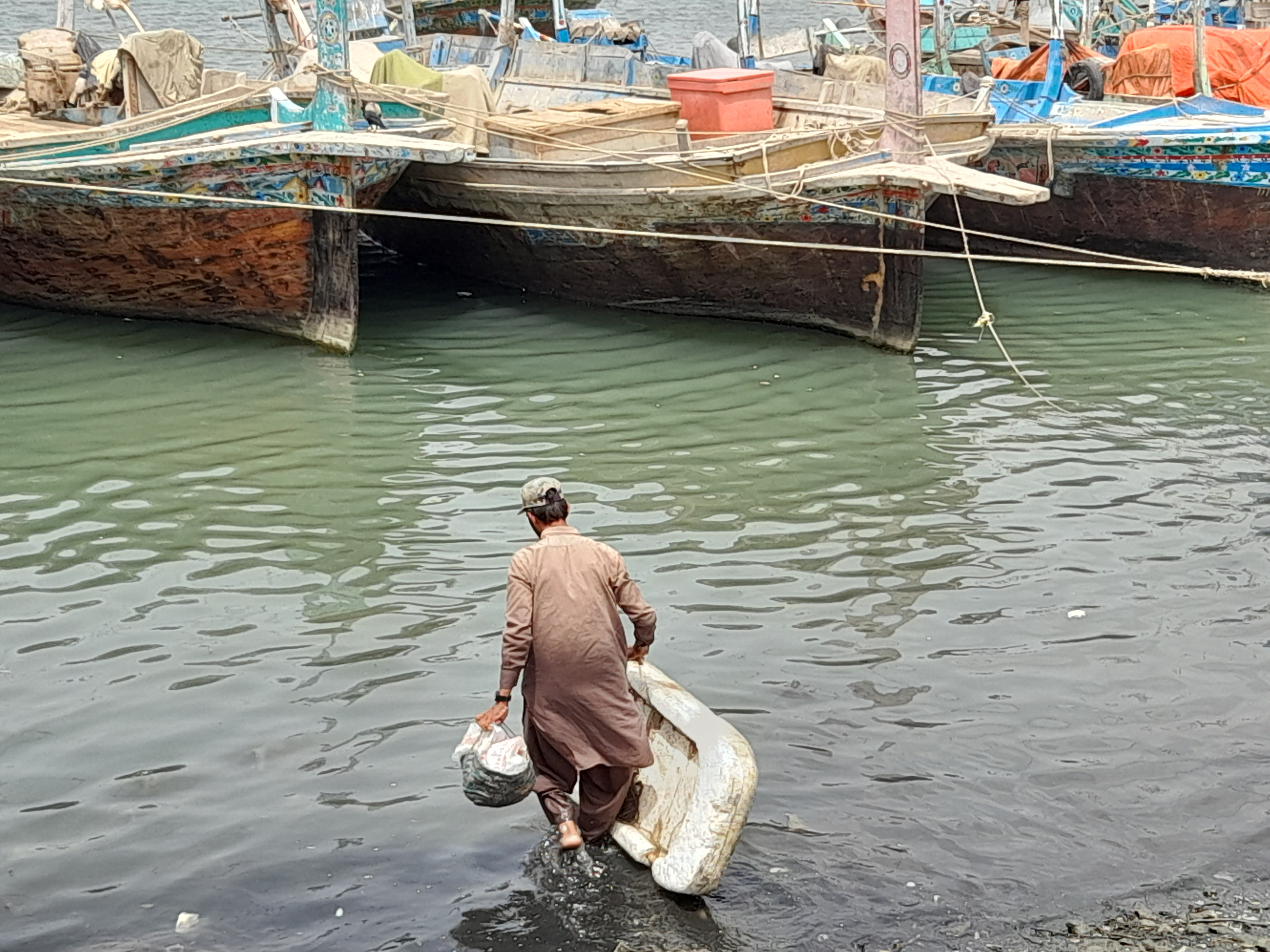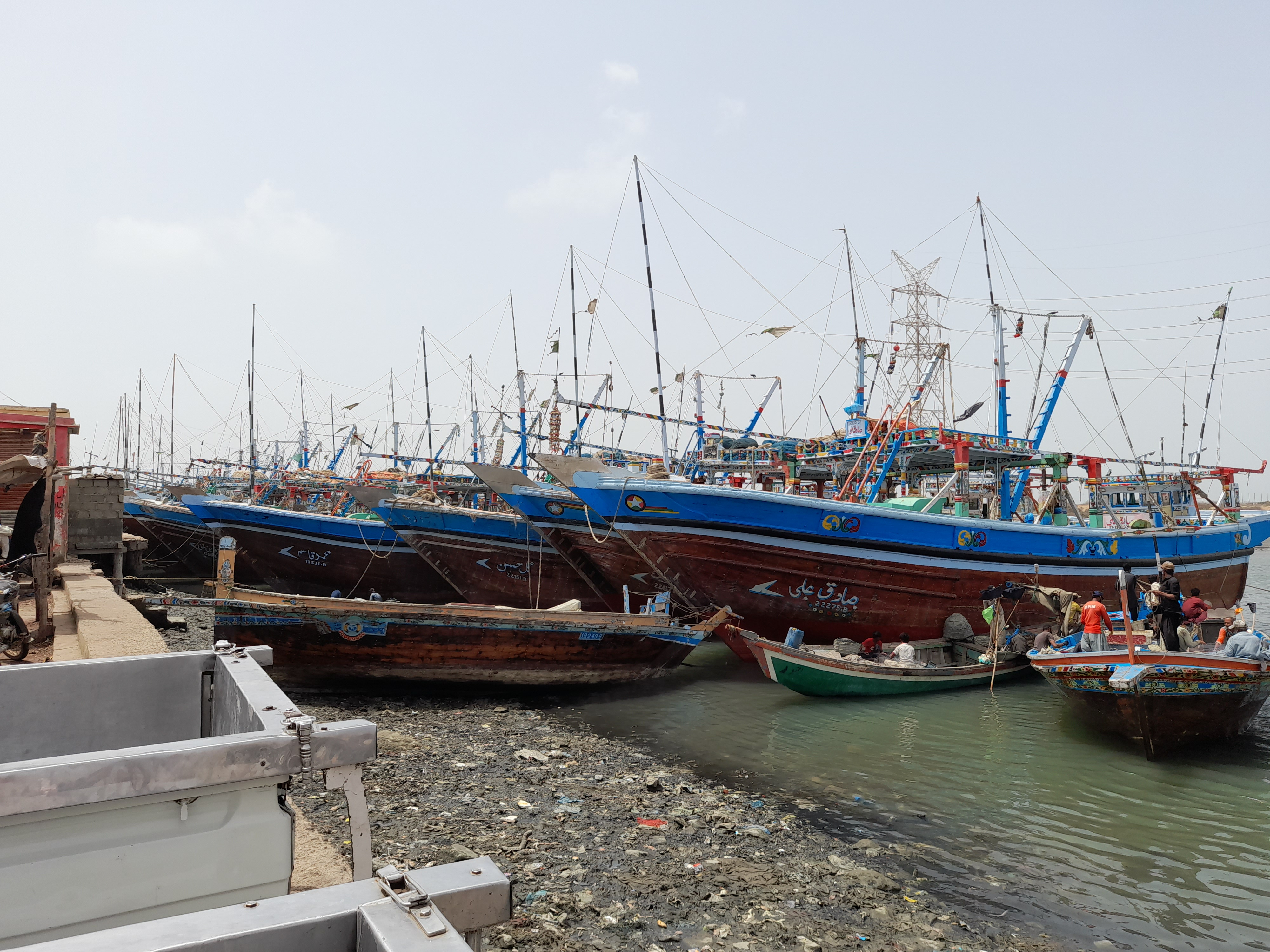Rising marine pollution in the Arabian Sea has led to a decline in sea resources and snatched away the livelihood from fishermen and the women associated with the fisheries industry.
While passing through the narrow and dusty streets of Ibrahim Hyderi one can easily noticed different groups of fishermen sitting sideways and doing nothing. It was a clear sign that they have lost their livelihood and facing dark phase of unemployment and poverty. The obvious reason behind this is sea pollution and climate change.
Naziraan Bibi, a 50-year old woman from Ibrahim Hyderi, some 400 years old fishing village located in Korangi district of Karachi says she lost her job when a shrimp peeling factory in her area closed due to decline in catch and soaring price of shrimp. “I lost my job when a shrimp peeling factory in our area closed due to decline in catch and soaring price of shrimps,” she said.
“My husband is a fisherman. He used to fish for a local contractor on a daily wages. He earned PKR 400 (USD $5.39) daily. When fish and shrimp started reducing, both of us lost our jobs. Since then, we are facing extreme hunger and poverty,” she added.
According to experts, 80 per cent of the population of Pakistan’s coastal belt is dependent on fisheries for food and living.
‘The sea is everything for us’

“As a part of fishing community, sea is everything for us. I used to work in a shrimp peeling factory near a jetty in our area since my childhood. But with the passage of time, swift decline in catch and reduction in shrimp’s quantity has made the situation from bad to worse for us,” said Naziraan. “I had two sons. My elder son Subhan died due to diarrhea. My younger son is 6- year old. My husband has been jobless for the past two years and we have been living on the food provided by neighbors or relatives but they are also facing difficult times.”
“Almost everyone in the area is jobless. Ibrahim Hyderi is our ancestral area but now we want to migrate from here but there is no place for us to go and live and earn livelihood,” said Naziraan while wiping tears from her face.
An ecosystem in crisis
Dwindling marine resources could produce serious implications on food security and aquatic life in future. According to Aslam Jarwar, Director Fisheries Sindh, resources have been stagnant for the last 30 to 40 years including fish production. In 2015, a study about stock assessment revealed that many fish species and major sea food groups have already reduced from 50 to 90 per cent. Nearly 80 per cent population of coastal areas is dependent on fisheries for food and living. Decline in marine resources poses a great food security risk for those who rely heavily on seafood.
“At least 500,000 to one million people have coastal dependency. There are approximately 5,000 boats at the coast of Sindh. Some are associated with processing and transportation. Environmental changes like increasing acidity in sea, rising temperature are among different reasons responsible for the disturbance of the environmental balance. An increase in the number of jellyfish in our sea during the last two to three years is an example of the environmental change impact,” Jarwar stated.
Professor, Director Center of Excellence for Marine Biology, University of Karachi Dr. Pirzada Jamal Siddiqui said one of the reasons behind increase in jelly fish is the factor which eats jelly fish or any other organism in eco system has been decreased due to sea pollution. Over fishing by big fishermen also responsible for decline in microorganism eating factor as well as damage faces by small fishermen. Besides, we are throwing plastic in the sea; it is returning back our plates after passing through different phases of food chain.
“Climate change is a cyclic process and the entire world is sharing same atmosphere. Climate change and its adverse effects is not only problem of Pakistan and India but it is a trans boundary and multinational which needs to be tackle collectively,” Dr Jamal said.
Daily life, an uphill task

The story of 48-year old Hajiyaani is not much different from Naziraan. Standing outside her semi dark one room house in a narrow lane in Ibrahim Hyderi, Hajiyaani shares her ordeal. “I was among hundreds of women working in fish and shrimp peeling factories. Till four, five years ago, we were financially stable. I earned PKR 300($1.90) daily by peeling shrimp in a factory. My husband also earned decent money by fishing. Slowly, industrial waste and garbage makes sea polluted and snatch our livelihood. I, along with my 12-years old daughter, forced to work as a domestic help in a nearby colony to meet both ends for our family. I have three daughters and a son. We are living in a single room and paying PKR 3,000 ($19.04) rent per month. It is very difficult to manage routine life without proper livelihood.”
Although the threat of climate change and its adversities is imminent, little efforts seen on ground to control this menace. The younger generation of fishing community still relies on the occupation of their forefathers. Lack of education and deprived of basic facilities, the younger lot does not have idea of acquiring some skill for earning. As a result, either they just roaming in the streets or falls into a petty crime to make some bucks.
The cost of climate change
“Climate change already did a sizeable damage. Many fish species have been depleted from Karachi’s coast line. Shrimps and fish are vanished even in mangroves and creek,” Kamal Shah, media coordinator, Pakistan Fisherfolk Forum, a non-governmental organisation working for Fishermen rights, said.
Recalling the old times, Shah stated that about three to four years ago, there were small huts in Pakistan’s largest fishing settlement Ibrahim Hyderi called ‘chaapray’ in a local language, served as small peeling factories. Fishermen community women were seen busy in peeling off shrimp whole day in these huts and in the evening dispatched them to large factories in the area for further processing. These big factories are now shut down and majority of women workers are sitting at home with no work.
Hopes for some relief
For fishermen community in Sindh’s coastal belt, a major breakthrough was happened in January 14, 2011 when Sindh Assembly has unanimously passed Sindh Fisheries Amended Act replaces contract/leasing system for fishing with license system. The act enables fishermen to get back their right to fish which was seized by the contractors and other influential people before the amendment.
Former Sindh Fisheries Minister Zahid Ali Bhurgari, who tabled Sindh Fisheries Amended Act in Sindh Assembly in 2011, when contacted said that enforcement of Amended act turned out to be a big relief for fishermen community. The act has ended the contract system and gave fishing rights back to ordinary fisherman. At least 1.2 million fishermen benefited by the act. Before amended act, 1,209 water bodies were auctioned to contractor and influential people. Contractor used to pay fisherman PKR 50( $0.32)or PKR 100($0.63). Now fishermen are independently doing fishing and gaining better monetary advantage.
“For the help of fishing community, a fund has been established by Fisherman Cooperative Society collects nominal amount from fishermen after their fishing trips and transfers it into this fund. The amount would be provided to fishermen for weddings or any emergency,” he added.
Some local and international organisations are busy in damage control exercise on their own level. They are giving training and support to fishermen community for the preservation of mangroves which serves as a nursery for fish species, shrimps and other marine life.
International Union for Conservation of Nature (IUCN) in collaboration with government of Sindh initiated mangroves plantation and preservation project for the wellbeing of fishermen community and trained them for alternate source of income.
“Mangroves plantation and restoration project is underway in Ibrahim Hyderi, Rehri Goth and Chashma Goth. We have trained fishermen, students and teachers of local schools how to plant mangroves. Now they are giving training to other community members. They have opened nurseries of mangroves and selling mangroves to different people and organizations. This is equally beneficial for fishing community and environment,” stated IUCN Pakistan’s Natural Resource Management Expert Dr Baber Hussain.
